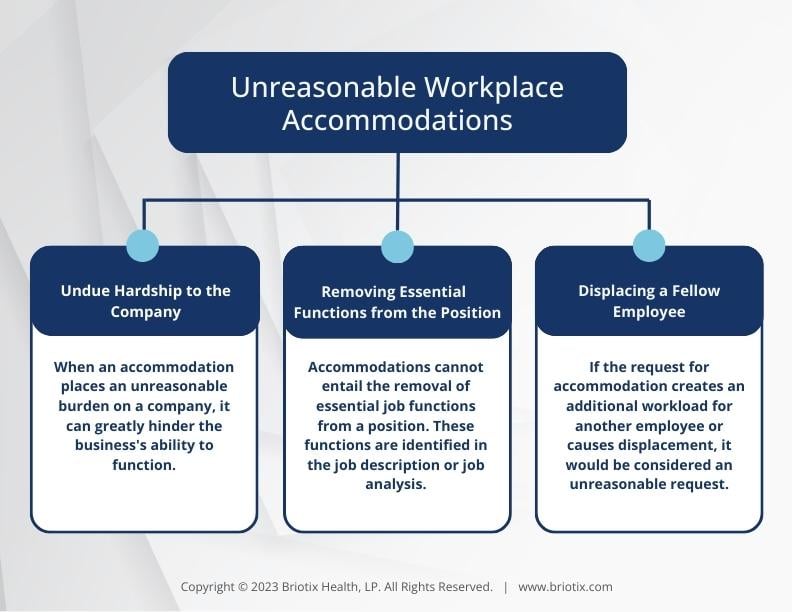
In all work environments, an accommodation is considered anything that allows someone to do the essential functions of their jobs. An accommodation could be equipment, coaching, scheduling, task rotation or job rotation; any change that allows someone to do the essential function of their job.
An employee requesting an accommodation may be as simple and straightforward as someone asking his or her supervisor for some sort of assistance to be able to complete a task. Concluding whether an accommodation request is reasonable or not is critical in determining how the employer will respond to that request.
Are your workers' comp claims too much?
Start thinking injury prevention and employee wellness.
What Determines Whether an Accommodation Is Reasonable or Not?
When it comes to accommodations, the employer is always the decision maker on whether something is reasonable or not. However, to comply with federal law under the American Disabilities Act, employers are required to meet all “Reasonable Accommodations.”
The law describes reasonable accommodations as anything that does not cause undue hardship to the business. Companies must meet all accommodation requests unless there are significant factors that will have a detrimental impact on business operations. The larger the company, the harder it is to say that something is unreasonable and will cause undue hardship.
Related: How Physical Therapy Expedites Return to Work
Reasonable vs. Unreasonable Accommodations
Determining whether an accommodation is reasonable or unreasonable is an interactive process. Typically, the employee starts the process by coming to the employer with a request and then the company and employee work together to determine the reasonable accommodation they will need to complete their job tasks.
As part of that process, the accommodation will be determined whether it is temporary or permanent. This is an important step as often temporary accommodations are reasonable because they can be met by an employer on the short-term with minimal hardship to the business. If the accommodation is determined to be permanent, there is more likely to be a case that the accommodation is unreasonable. Ultimately, a doctor makes the decision if the accommodation needs to be temporary or permanent.
Whether the accommodation is temporary or permanent, employers must exhaust all options to meet the accommodation for it to be determined as unreasonable. If all reasonable options have been exhausted and an employer cannot meet the accommodation request of the employee, there are a few options. In best case scenarios, the person needing the accommodation would be able to move to a different position that wouldn’t require the accommodation. If that is not an option, termination is a possible outcome.
Related: When Can Carpal Tunnel Be Considered Work Related?
When Does a Reasonable Accommodation Become Unreasonable?
Accommodations that are determined to be reasonable when put into place do not become unreasonable unless they are putting an undue hardship on the business operations of the company. Therefore it is important that an employer have a clear criterion on accommodations.
There should be also be a clear path and procedures that employees use to request and receive an accommodation. When a clear process is in place, employers can ensure they are meeting reasonable accommodation requests only. Additionally, it is important that employers document all steps of the accommodation process.
Many companies have determined that medical documentation is a requirement for an accommodation request, however, employers are not able to require diagnostic information, only a doctor’s note. While this is common practice, it is also recommendation that employers start the process on good faith while waiting on a doctor’s note. Employers should try to accommodate employees to best meet their needs because it allows the employee to function at the highest level within their job.

Examples of Unreasonable Accommodations in the Workplace
When determining if an accommodation is reasonable or unreasonable, there are three criteria that must be considered.
1. Undue Hardship to the Company
If an accommodation puts an undue hardship on a company that would significantly impact the ability of the business to operate, the accommodation would be considered unreasonable.
For example, an accommodation request may include a job-sharing situation that requests the hiring of another to share the job. This could be an undue hardship for a sole-proprietor’s small business that produces a small amount of revenue and only has one employee in that position.
2. Removing Essential Job Functions from the Position
Accommodations cannot require that an essential job function be removed from the position. An essential job function would be determined based on the job description or job analysis that is associated with the required tasks of the position.
For example, it may be unreasonable to accommodate restrictions of no typing greater that 30% of the day if the person’s essential job function is primarily data entry. However, an accommodation could be considered to provide voice to text data entry, but that may not be feasible within specific industries that deal with private data.
3. Displacing a Fellow Employee
An accommodation would be determined to be unreasonable if the request included the displacing of a fellow employee. Additionally, an accommodation cannot put an additional workload on another employee.
For example, if an essential job function is that everyone lifts 75 pounds per day, but someone needs an accommodation that requires them to only life 50 pounds, no other employee can be required to lift 100 to make up for the accommodation. However, an accommodation for a mechanical lift may be considered to meet the accommodation without requiring additional work from another employee.
When it comes to accommodations, there is very little that can be determined as unreasonable. If a company can accommodate, it is always best to meet the needs of employees. This allows them to complete their tasks at the highest level and avoid unnecessary pain.
